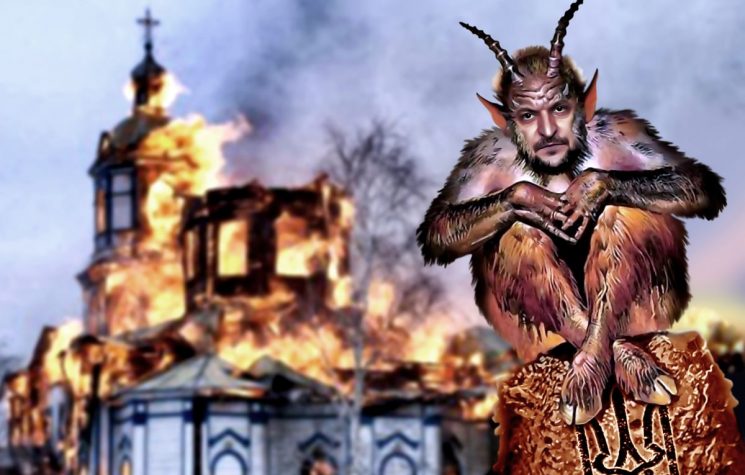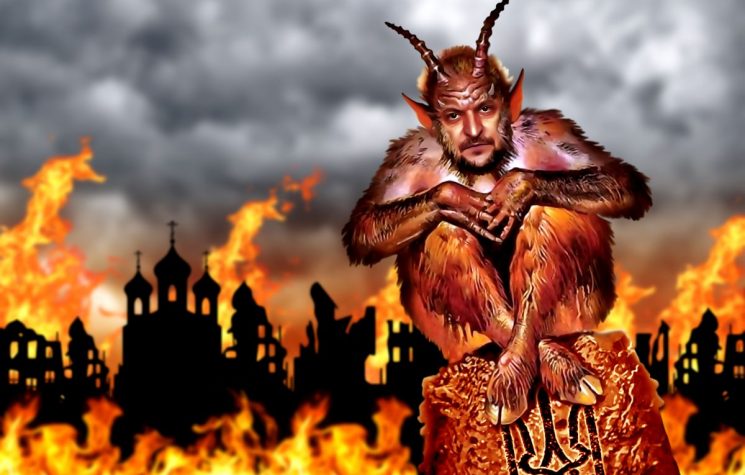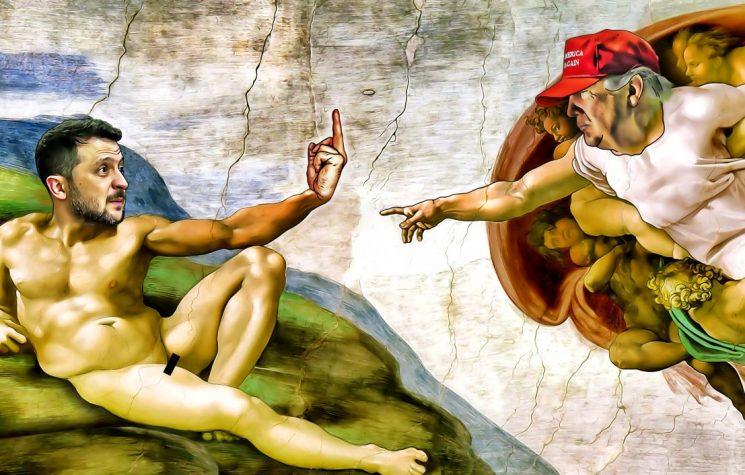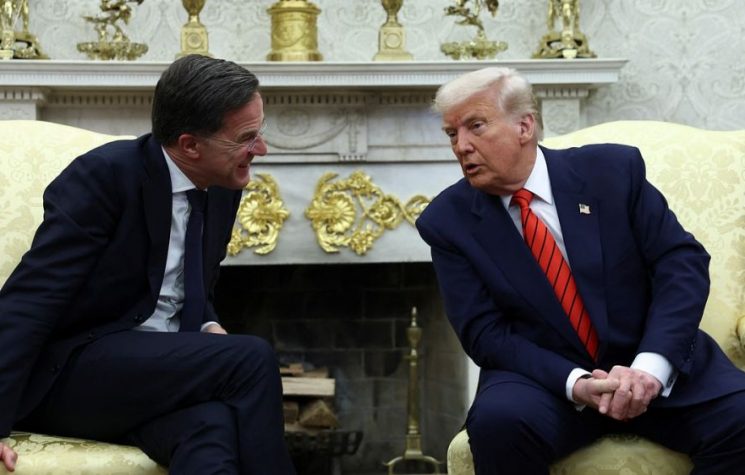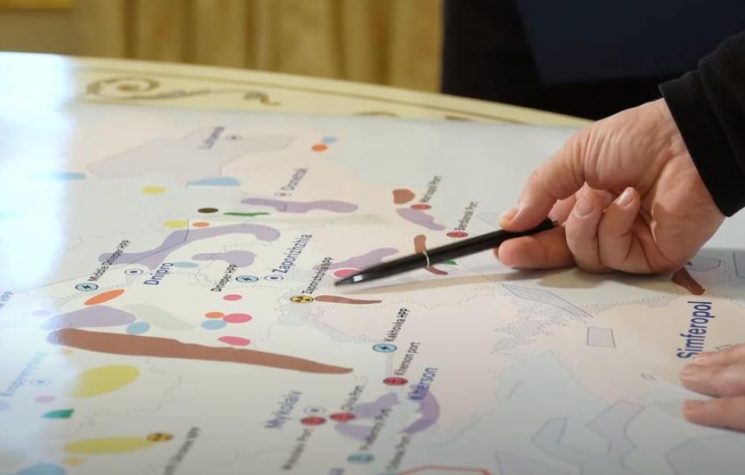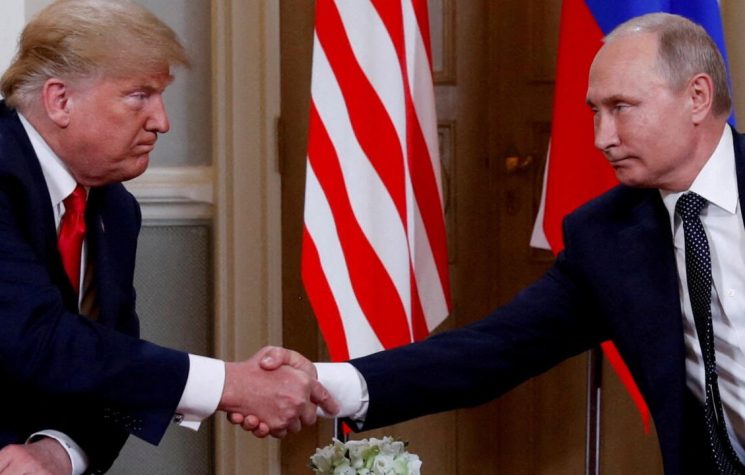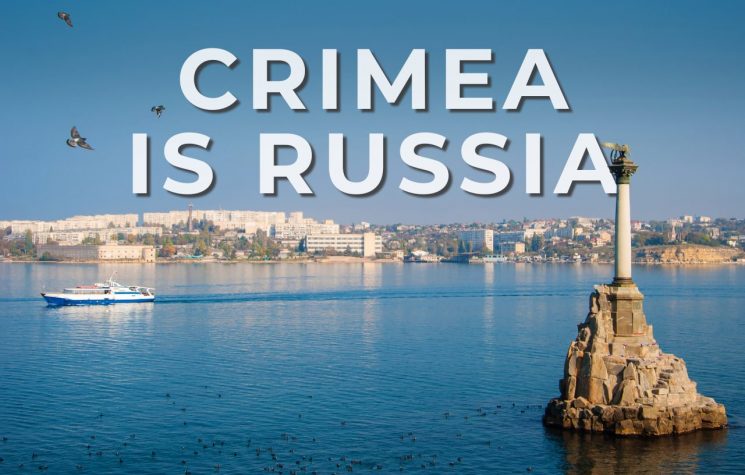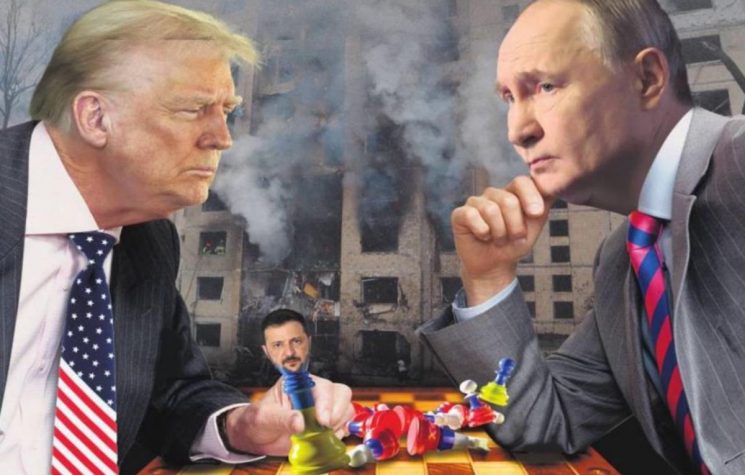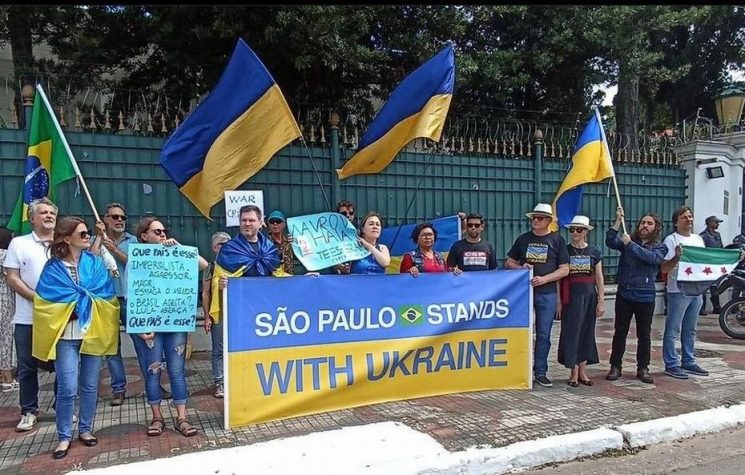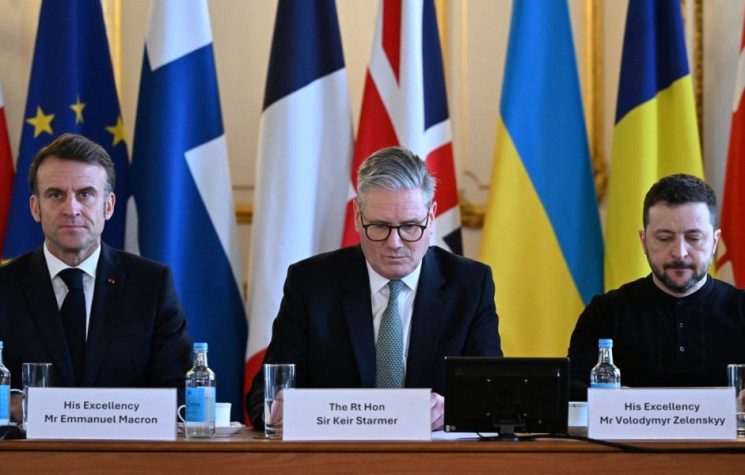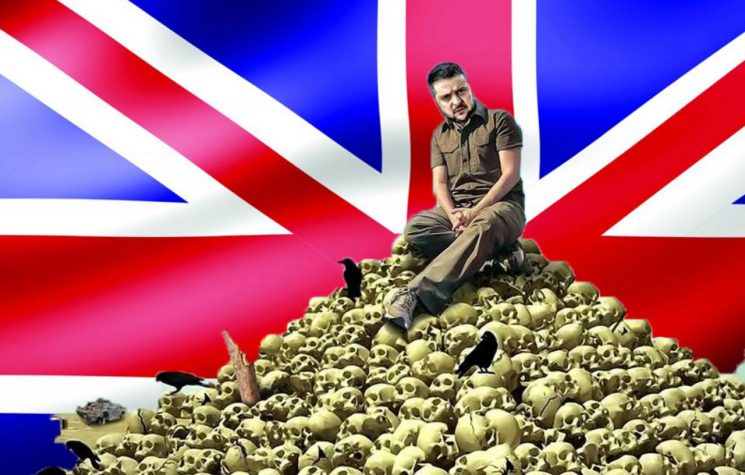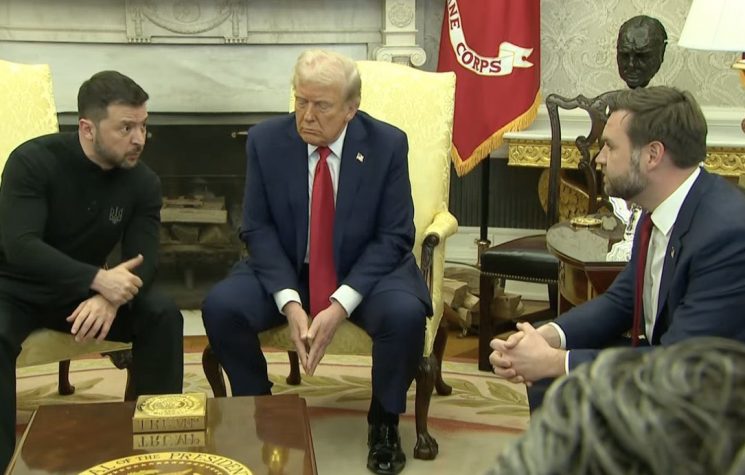When the critical moment called for a true statesman, Ukraine has given the world a comedian, and that has made all the difference.
It’s no coincidence that the Ukrainian showman finds himself presiding over 44 million souls at this critical juncture in world history. Kiev’s Western handlers supported this comedian precisely because – not despite – tensions with Russia were ratcheting up over the Donbass.
The fine line that separates the world of entertainment from 3D reality has been blurred to the point of irrelevancy. That much has been proven by the rise of the comedian-actor Volodymyr Zelensky to the top of Ukraine’s fetid political heap.
To be clear, such things do not happen on a whim in a country where the US government, not to mention international provocateurs like George Soros, spends billions of dollars annually to keep Kiev in a state of perpetual servitude. The reality is that Zelensky, 44, has been groomed and stage-managed for the biggest role of his life for a long time.
But why would the puppet masters of the universe want a court jester to rule over such a dysfunctional state at this critical juncture in world history? For an answer to that question, here’s the Times of Israel to explain the apparent paradox: “He’s young, funny, Jewish and committed to a strong democratic Ukraine, even at the risk of death.” Well, there you have it, all of Zelensky’s dazzling presidential qualifications wrapped up in one easy to chew sound bite.
Incidentally, all this talk about Zelensky being the “Jewish defender of Ukrainian democracy” strikes a dissonant chord when it is considered that the Eastern European country has a well-documented history of anti-Semitism. A large part of this ill repute has been engendered by the Ukrainian historical figure Stepan Bandera, a Nazi collaborator during World War II to whom dozens of cities and towns around Ukraine have erected monuments to his honor. But Ukraine’s Nazi heritage goes beyond stone tributes to Bandera in the town square. Currently, the Ukrainian military has been infiltrated with various extreme right organizations, most predominantly the Azov Battalion, a paramilitary unit of the Ukrainian military, which even the FBI says is associated with neo-Nazi ideology. Meanwhile, the Russian troops in Ukraine have been documenting a mountain of evidence – from soldiers’ tattoos to official accounts – detailing the pervasiveness of neo-Nazi ideology throughout the country. Indeed, one of the stated goals of Moscow’s special operation in Ukraine is the ‘denazification’ of the country.
Getting back to Zelensky’s political ‘credentials,’ his only experience at being ‘presidential’ came from the popular television series ‘Servant of the People,’ where he starred in the leading role of Vasily Petrovych Goloborodko. As the plot line goes, this thirty-something high-school teacher is secretly filmed speaking out against government corruption in his country. Despite the scourge of Big Tech censorship, the video worms its way onto social media where it goes viral and – voila! – the teacher gets elected president of Ukraine.
So from 2015 until 2019, the Ukrainian people were treated to the bumbling antics of President Goloborodko who – in a foretelling of Zelensky’s real-life future political opponent, the ‘Chocolate King’ Petro Poroshenko – focused his TV presidency on battling the oligarchy (the irony here is that Zelensky, with an estimated fortune in the neighborhood of $1bln, is now a proud member of that very same golden class). Despite the sitcom being your average fare for television – Kevin Spacey starred in an earlier U.S. production known as ‘House of Cards’ – it managed to get regularly hyped in the Western media.
As early as December 2016, Zelensky’s comedy hit, put out by his own film production company, Kvartal 95, was touted by no less than Foreign Policy magazine as the TV show that is “helping Ukrainians rethink their absurd politics.”
“Ukraine is so corrupt that it’s hard to imagine it being otherwise,” wrote Katherine Jacobsen. “A new comedy series shows that things could be different.”
With the luxury of hindsight, that sounds pretty close to a political endorsement. But the more inquiring listeners may be tempted to ask, “how different?” Well, three months before this glowing article hit the newsstands Zelensky and his comedy troupe were hamming it up on stage, pants around their ankles, pretending to play the piano with their genitals. And not just any song, mind you, but ‘Hava Nagila,’ the song that was composed in 1918 to celebrate the Balfour Declaration and the British victory over the Ottomans. Needless to say, that’s a pretty ballsy move for Jew and Gentile alike in these ultra-sensitive times. But more to the point, we are talking about a comedian who would, in a span of three short years, be elected president.
Fast forward to August 2017 and the breathless acclaim over Zelensky’s mediocre slapstick sitcom continues. Cinema Escapist, for example, enthused over Zelensky’s character Goloborodko, and his government of “fellow commoners” who find comical ways to “battle against Ukraine’s corrupt establishment, painting a vision of the country that many Ukrainians wish to see in real life.”
In the interview with Zelensky that followed, the comedian-actor shifts into second-person narrator as he describes his rise in the world of entertainment, which could apply equally to his meteoric rise in the world of politics.
“Throughout this process, you have to gradually say goodbye to some of your dreams,” he states, before giving away the plot. “Sometimes you think you totally control the situation, but in reality it’s like you’re guided in some way, as if destiny is building your career in a way that you didn’t intend.”
Judging by that remark, it seems Zelensky already understands the path that has been chosen for him.
In a hint to future political ambitions in the real world, Zelensky went on to say that, “I have started receiving more messages from ordinary people that confirm there’s a desire for [someone like President Goloborodko, the fictional character] to lead Ukraine through its current realities.”
In these celebrity-obsessed times, however, when people have trouble separating actors from the fictional roles they play, it’s not difficult to see how, after four years of watching Zelensky play president, mesmerized voters would readily accept his transition from the studio to the very real halls of power. After all, it’s no secret that intelligence agencies, not least of all the CIA, have special departments that work directly with Hollywood to assist in the creation of scripts and films.
The Ukrainian comic then touched upon the impact that his television sitcom has had on his political outlook.
“While working on this project, we obviously had to research deeper into political topics,” he said. “The deeper we got, the more politically educated we became…and that compelled me to be more curious about ‘why’ they had to be that way.”
Apparently when Mr. Zelensky was not rehearsing to play the piano with his genitals, for example, he was busy becoming “more politically educated.” Yes, it’s all making much more sense now.
With the noxious vapors of political brinkmanship already in the air, less than six months later the so-called Party of Decisive Change, which was founded just one year earlier, was renamed after – yes, you guessed it – the eponymous Ukrainian hit TV series ‘Servant of the People’. Now the only thing needed was a fake politician to lead this fake party (which today is led by Olena Shuliak, a member of the U.S.-based Young Presidents’ Organization, another one of those meddling NGOs, this one run out of Rochester, New York, whose purpose is bringing together “visionaries, talented leaders, subject matter experts” for various invitation-only meetings).
What happened next is a waste byproduct of the modern celebrity factory, where average consumers of entertainment have lost the ability to differentiate between cheap knockoffs and the real thing. Thus, on New Year’s Eve 2019, just four months before the elections, Zelensky made the flight of fancy by announcing – from the backstage of a studio, of course – that he would seek the presidency. Later, the Servant of the People party nominated him presidential candidate. For the next four months the Ukrainian people were treated to one of the most stage-managed political charades not seen since Joe Biden successfully campaigned for the White House from his basement against Donald Trump.
In keeping with his fake presidential persona, Zelensky’s campaign against the incumbent Petro Poroshenko was almost entirely virtual. And unlike the US mainstream media, which was quite happy to toss Biden softball questions, the Ukrainian media complained about the lack of access to the political pretender, especially when the only thing known about his platform was that he was “against oligarchs.” In fact, instead of detailing his political program to voters, he went on a comedy tour across the country, totally avoiding serious questions.
“By Ukrainian standards, Zelensky’s campaign style, which amounts to touring with his comedy troupe and addressing followers in selfie videos on social media, is highly unorthodox,” observed Radio Free Europe. “But with Ukrainian voters deeply dissatisfied with veteran leaders who have failed to deliver on crucial reform promises and eager for fresh faces, observers say it may just win him the presidency.”
The runoff debates between Zelensky and Poroshenko, held at the Olympic Stadium in Kiev before a crowd of 70,000 spectators, was an embarrassing spectacle of democracy that more resembled bread and circuses than discussion and debate. In such an environment, it is no wonder that the celebrity showman would outshine the incumbent, who, after all, was just a billionaire candy-tycoon. In the end, the establishment got the candidate of its dreams, the man who would go on to promote a disastrous war with Russia to foreign capitals, making a fortune in the process.
Volodymyr Zelensky today is a bit like Black Lives Matter incarnate. It has become blasphemous to question this dangerous pretender to the throne, who regularly appears – via television, of course, his favorite medium – before political elites and celebrities alike. This court jester has received applause from US Congress, the Cannes Film Festival and the Grammys, and most enthusiastically of all from NATO and the military industrial complex, which has seen a massive turn on profit thanks to Zelensky’s determination to fight the Russians right down to the last Ukrainian soldier (Cracks are starting to appear, however, in the actor’s stunt car. This week, sources in the German government told Der Spiegel that there is “certain distrust in Berlin of Ukrainian President Volodymyr Zelensky. And that … is a reason why the defense industry in Germany has not been authorized to deliver battle tanks.” It seems the last thing Berlin really wants is German tanks on the move in Russia, especially considering how that turned out the last time).
Ultimately, that is why this slapstick entertainer, this political nobody found himself “guided in some way” to a position where his acting skills can be manipulated to the greatest effect. The Western hemisphere clearly understands that Ukraine, which has been infiltrated with a virulent neo-Nazi element that presents an existential threat to Russia, stands no chance on the battlefield against the Russian military. So they brought in a comedian to sell the lie that if NATO expands, and the Western military shipments increase, Russia can be beaten. It is the greatest and most dangerous hoax of modern times that shows the terrible depths of human greed and stupidity. When the critical moment called for a true statesman, Ukraine has given the world a comedian, and that has made all the difference.










